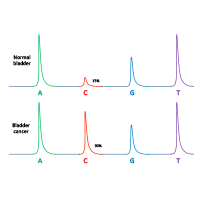Novel biomarker approach predicts patient outcome in bladder cancer

In exciting new published work, researchers in Keele University's Research Institute for Science and Technology in Medicine, and in collaborations with groups in the universities of Birmingham and Nottingham, have for the first time identified specific methylation-biomarkers that reliably predict disease outcome in high-grade bladder cancers.
The particular bladder cancers investigated have unpredictable outcomes with many recurring or becoming more aggressive and where some patients succumbing to disease within one year of initial diagnosis. The Epigenetics Research group within ISTM looked for epigenetic modification to DNA derived from a unique cohort of these tumours that were collected at initial diagnosis. The studies identified several key genes, representing a unique epigenetic- signature that reliably predicted disease outcome.
Mark Kitchen, a urology registrar at the University Hospital of North Midlands, and first author of the publication, performed these innovative studies in part fulfilment toward his PhD thesis and within ISTM. He said the findings may help guide patient treatment despite the highly unpredictable nature of this disease and that further investigation, including validation in larger patient cohorts are required to confirm and extend these findings.
The study was funded by a Urology Trust Fund grant, the North Staffordshire Medical Institute and Institution funding. The authors of the publication, from several institutions and geographic locations are, Mark Kitchen, Rik Bryan, Kim Haworth, Richard Emes, Chris Luscombe, Lyndon Gommersall, KK Cheng, Maurice Zeegers, Nick James, Adam Devall, Tony Fryer and William Farrell.
Illustration: Researchers used cutting edge technology to identify changes in bladder cancer compared to normal bladder. These changes might help us predict how aggressive a cancer is and what treatment is best.

